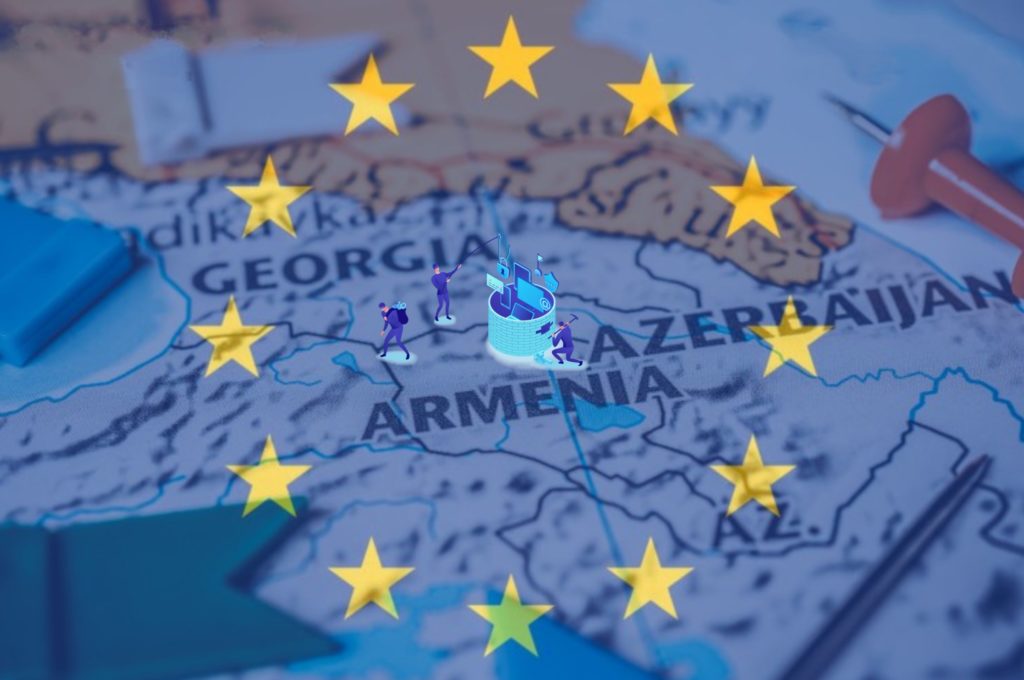Highlight 9/2024 – EU Policy Responses to the Hybrid Threats in the South Caucasus
Tamari Tabatadze, 28 February 2024

1. https://www.dunedinit.co.uk/wp-content/uploads/2022/08/2022-cyberattacks.png?fbclid=IwAR2tsyMmGLn2LHazJVtiIoZL0fry_B-ErnvxC76U7XLdjN_Q0f8ojiOvk9g
2. https://gip.ge/series-of-policy-briefs-on-the-geopolitical-shift-in-the-south-caucasus-region/
The South Caucasus region, encompassing Armenia, Azerbaijan, and Georgia, confronts a complex web of geopolitical challenges stemming from unresolved conflicts, ethnic tensions, and external interference. In recent years, this region has encountered a new breed of challenges known as hybrid threats, including information manipulation and cyberattacks. Notably, the South Caucasus faces heightened susceptibility to Russian influence, with many hybrid warfare tactics originating from Kremlin. This poses a significant impediment to regional stability and security. In response to these threats, the European Union has developed a multifaceted approach aimed at enhancing stability and resilience within the region.
European Commission’s Joint Communication on countering hybrid threats recognizes the need for the Union to increase its capacities as a security provider in the eastern and southern neighborhood. The EU’s approach to addressing hybrid threats in the South Caucasus is based on a combination of diplomatic engagement, capacity-building, and support for regional cooperation initiatives. One key pillar of the EU’s strategy is to strengthen the resilience of South Caucasus countries against hybrid threats through targeted assistance programs. The Commission Implementing Decision on the Annual Action Plan in favour of Georgia 2023 builds on ongoing support for strengthening the human rights framework, resilience and accountability of the national security system, including resilience against hybrid threats in Georgia. One of the direct responses to disinformation is awareness-raising communication campaign “EU for Georgia”.
Furthermore, a pivotal element of the European Union’s institutional response to deter and counter hybrid threats has been the establishment of StratCom (Strategic Communication) forces within the European External Action Service (EEAS), with a particular focus on the Eastern Partnership region. These StratCom forces are dedicated teams tasked with analyzing, monitoring, and responding to disinformation, propaganda, and other hybrid tactics aimed at the Eastern Partnership countries, including Armenia, Azerbaijan, and Georgia. Therefore, this tool helps empower South Caucasian citizens to critically evaluate information. Additionally, it collaborates with the local media, civil society organizations, and government agencies to promote the principles of transparency and accountability.
EU actively participates in political dialogues on security with countries in the South Caucasus region. In November 2023, the second high-level EU-Armenia Political and Security Dialogue took place, affirming the shared commitment to deepen their collaboration in security and defence policy domains. Participants specifically addressed hybrid threats and various other security challenges facing the region. The fourth EU-Azerbaijan Security Dialogue, held on May 2023, was focused on issues of mutual interest in the area of foreign and security policy, and future cooperation on cyber and hybrid threats. In January 2024, during the six high-level EU-Georgia Strategic Security Dialogue, both sides reaffirmed their strong dedication to further enhancing security cooperation in building Georgia’s security resilience to tackle hybrid threats.
In conclusion, the EU has clear and firm vision of promoting a more resilient society in the South Caucasus region. It has been actively engaged in high-level negotiations and confidence-building measures to counter the harmful effects of hybrid threats.
Tamari Tabadze, Highlight 9/2024 – EU Policy Responses to the Hybrid Threats in the South Caucasus, 28 February 2024, available at www.meig.ch
The views expressed in the MEIG Highlights are personal to the authors and neither reflect the positions of the MEIG Programme nor those of the University of Geneva.
